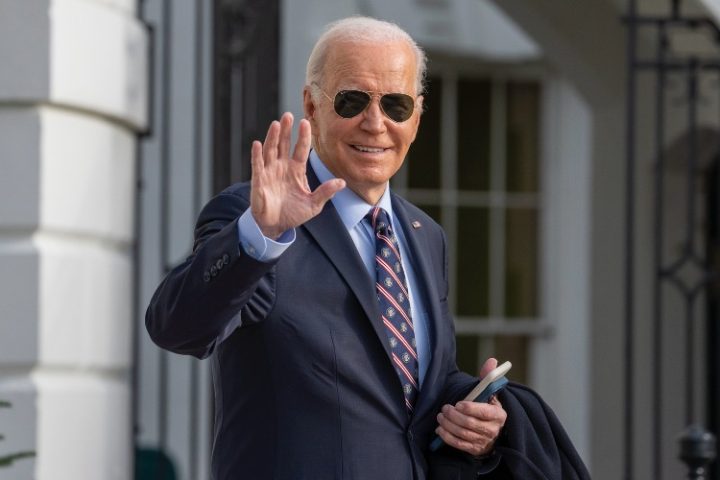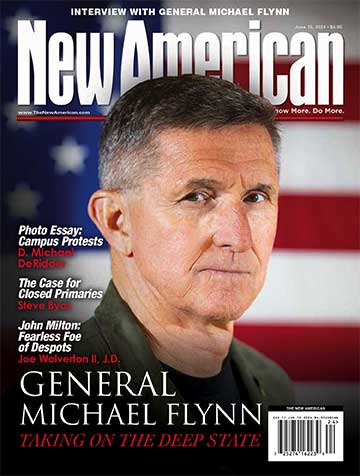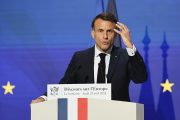
Russia could stage an attack on NATO, sparking a global conflict involving American troops, U.S. President Joe Biden claimed on December 6, while prodding Congress to pass a $111 billion national security package.
The bill, which was supported by Democrats, entailed funding for Ukraine, Israel, and Taiwan. Moreover, Biden criticized Republicans who have refused to support his bill owing to unhappiness over security at the U.S. border, alleging that these Republicans “are willing to give [Russian President Vladimir] Putin the greatest gift he could hope for.”
“If Putin takes Ukraine, he won’t stop there,” Biden asserted. “If Putin attacks a NATO ally, well, we’ve committed as a NATO member that we’d defend every inch of NATO territory,” he declared, elaborating that Washington would like to prevent such a confrontation as it could lead to “American troops fighting Russian troops.”
Nonetheless, Republicans refused to budge, blocking the spending package in the Senate, with the final vote of 49 in favor and 51 against. All GOP lawmakers objected to the measure. Opposing the measure also was Independent Senator Bernie Sanders, who typically votes with Democrats. However, Sanders voiced fears about Israel’s military strategy in the conflict with Hamas. Democratic Senate Majority Leader Chuck Schumer also voted “no” to have an opportunity to reintroduce the package later.
Moscow’s ambassador to Washington Anatoly Antonov, responding to Biden’s comments about a potential clash between Russia and NATO, suggested that “such bogeyman stories are fabricated in order to justify to taxpayers and sober-minded political forces the huge expenses for ‘containing’ the Russian Federation.”
Washington’s talk about a potential stand-off show that “[U.S.] authorities have finally lost touch with reality,” he added. “This kind of provocative rhetoric is unacceptable for a responsible nuclear state.”
Antonov rebuffed Biden’s narrative, accusing those who reinforce it of “myth-making and [the] propagation of dangerous lies” about his nation.
“In an attempt to ‘add fuel’ to the fire of the Ukrainian proxy war, [U.S.] authorities have finally lost touch with reality,” he declared in statements posted by the embassy.
“Washington and [the] insatiable US military-industrial complex are direct beneficiaries of the bloodshed in Ukraine,” Antonov went on.
In his pitch to Congress, Biden alleged that Putin’s ambition was to “dominate Ukraine” and warned that “the entire world is watching” Washington’s actions. America is “the reason Putin has not totally overrun Ukraine and moved beyond that,” he contended.
Moscow has claimed that NATO’s enlargement in Europe and the pledge that Ukraine will ultimately join the U.S.-led military bloc as reasons for the current Russia-Ukraine crisis. Although the Russian side was open to a truce with Ukraine in the early stages of the conflict in exchange for Ukrainian neutrality, Kyiv dismissed the notion of a proposed peace agreement and opted for continued hostilities after then-U.K. Prime Minister Boris Johnson told the country to “just make war,” based on statements by David Arakhamia, who headed the Ukrainian delegation at the Türkiye-mediated negotiations.
For his part, Biden lampooned Republicans who “literally kneecap Ukraine on the battlefield” and “give Putin the greatest gift he could hope for and abandon our global leadership not just to Ukraine.”
On December 6, Russian Foreign Ministry spokeswoman Maria Zakharova has warned that her country will destroy U.S.-made F-16 jets deployed to Kyiv even if they operate from bases outside Ukraine. Speaking at a regular briefing, Zakharova said that Russia had known that the West would soon supply Ukraine with advanced fighters, the first delivery of which is scheduled for next year.
Nonetheless, Zakharova mentioned that “a significant part of Ukraine’s airfield infrastructure has been destroyed, and those American fighters may be operating from airfields outside the country,” including in Poland, Slovakia, and Romania.
“The Russian Armed Forces will consider fighters participating in the conflict on the side of the Ukrainian military as legitimate targets to be destroyed,” the spokeswoman said.
Zakharova further indicated that the upcoming F-16 deliveries would cause NATO to “become even more mired in the Ukraine conflict,” adding that by sending arms to Kyiv, the U.S.-led military bloc is de facto “waging a hybrid war [against Russia] under the guise of saving Ukraine.”
Ukraine has long requested advanced jets from the West, arguing that they would be key in tackling Russian air superiority. In May, after months of hesitation, the U.K. and the Netherlands proclaimed “an international coalition” to help Kyiv procure F-16s.
In August, the United States gave the green light for Denmark and the Netherlands to re-export the fighters to Kyiv, which pledged to send up to 61 jets — while also permitting European countries to train Ukrainian pilots. In October, Belgium also said it would supply Ukraine with an unspecified number of U.S.-made fighters from 2025 onward.
The United States itself has also joined the effort to train a “small number” of Ukrainian pilots on its soil, with about 200 additional personnel poised to receive maintenance training.
On December 5, Ukrainian Foreign Minister Dmytro Kuleba said that all political decisions about the F-16 deliveries had already been made and that the planes would arrive in the country once all technical issues had been addressed.
Russia has repeatedly warned the West against arms deliveries to Kyiv, noting that they would only prolong the conflict, but would not change its outcome. Russian Foreign Minister Sergey Lavrov has also said that Moscow would deem the shipments of F-16 a “nuclear threat,” given that some modifications could carry atomic weapons.
That same day, Aleksey Goncharenko, a member of the Verkhovna Rada, posted on Telegram that Ukraine’s hopes for speedy accession to NATO have been dashed, alleging that Washington is so “annoyed” at the idea, it has banned its European allies from even broaching the subject.
In 2017, Kyiv declared that NATO membership was a strategic goal of its foreign policy, submitting a formal application to join in the fall of 2022, after four of its former regions voted in a referendum to join Russia.
Moscow has repeatedly highlighted that it considers Ukraine’s potential NATO membership, along with the bloc’s eastward expansion, to be a key security threat. Putin has indicated that Kyiv’s plan for NATO membership was one of the major reasons that sparked Russia’s military operation in Ukraine.
“There will be no NATO,” Goncharenko said in his Telegram post, citing an “insight” he purportedly received from unnamed U.S. officials in Washington. According to him, U.S. Secretary of State Antony Blinken explicitly told America’s European allies to stop mentioning the matter.
The issue of Ukraine’s prospective NATO membership “annoys the elites of the USA and they [have] clearly signaled that Ukraine will not become a member” of the bloc even after its ongoing conflict with Russia ends, Goncharenko posited. Kyiv might obtain some “favors” but nothing more substantial, he claimed, adding that Ukraine would certainly not become a part of the bloc next year.
The lawmaker stated that the government of Ukrainian President Volodymyr Zelensky has already come to terms with this reality and is now working on Ukraine’s EU membership instead.



